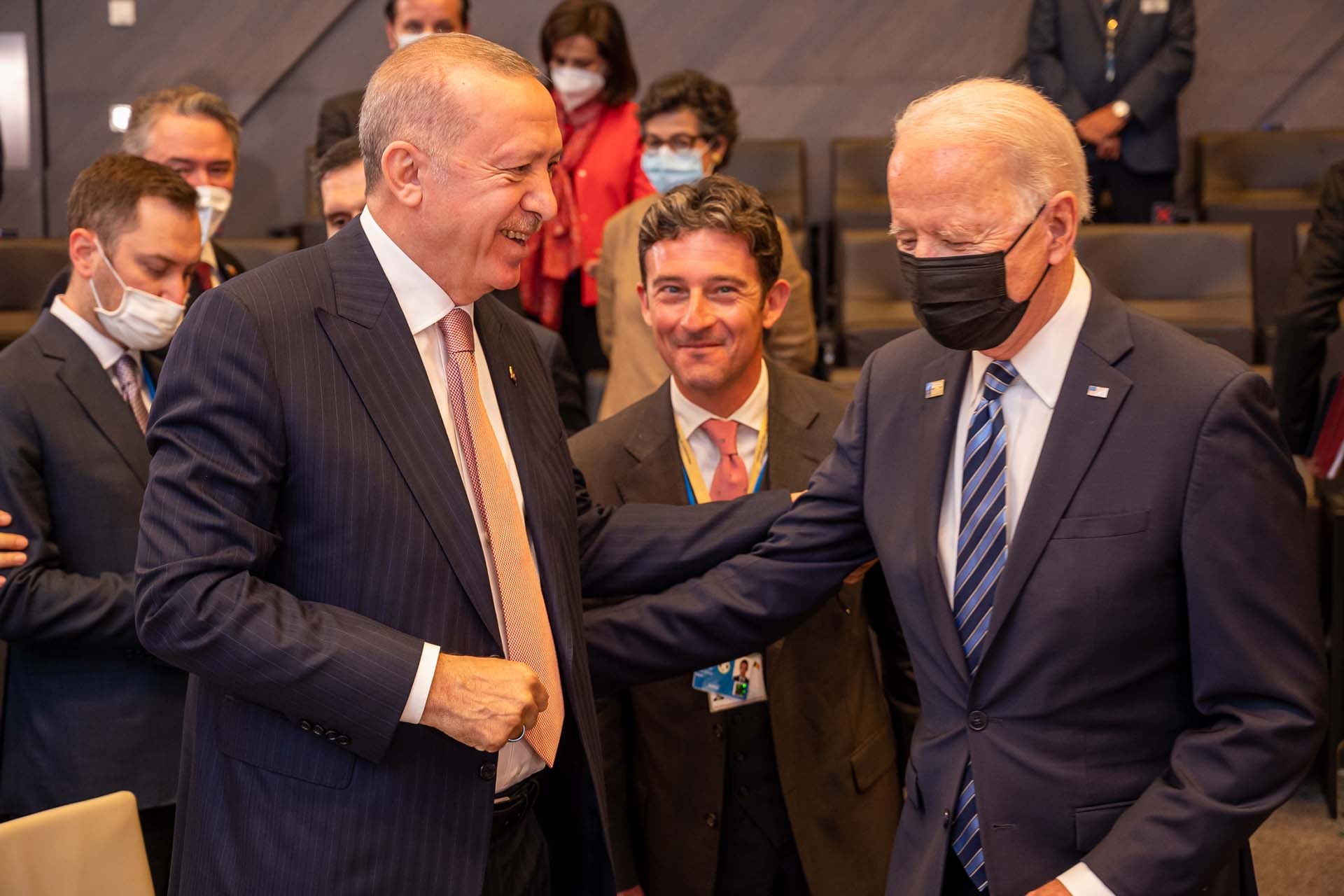Hegemonic restoration

M. Sinan Birdal

Tayyip Erdoğan, Joe Biden | Fotoğraf: NATO/Pool
President Joe Biden delivered a short message at the NATO summit in Brussels. He said: “The United States is back.” Thus, he emphasised that the America First approach followed during the Donald Trump era is over and that the USA will once again proceed with multilateral diplomacy. Biden is updating the US’ alliances in its foreign policy as an integral part of the social state and industrialisation strategy he pursues in domestic politics. Is a new Roosevelt era beginning? Can the USA “restore and build” the hegemonic order it established after the Second World War?
If we review the international politics of the last twenty years, it will not take long to realise that Biden's move is actually the second time the US is being reborn. The one-sided policy followed by the New Conservative clique in power under President Bush, and which became evident with the 2003 invasion of Iraq, dealt a major blow to transatlantic relations. Just like Trump, Bush claimed that the US did not need the approval of the dysfunctional United Nations and the outdated NATO alliance, but was strong enough to act with a “coalition of the volunteers”. The message conveyed the arrogance of the US administration: “You are either with us or against us.”
Barack Obama, who came to power in 2009, was met with much more enthusiasm than Biden in Europe as Europe had been eager to shrug Bush off. Obama made the most foreign visits in the first year of his power and began his trips with Canada on February 19, 2009. He attended the G-20 summit in London on 31 March-3 April, followed by the NATO summit in France and Germany on 3-4 April. He held the US-EU summit on April 4-5 and gave his famous speech against nuclear weapons in Prague. He was greeted with enthusiasm in Ankara and Istanbul on 5-7 April with “baklavas” specially prepared for him.
He completed his grand tour by meeting with Celal Talabani and Nuri al-Maliki in Baghdad on 7-8 April. For this and his subsequent diplomatic moves, Obama was awarded the 2009 Nobel Peace Prize. However, the legacy of the most eloquent and charismatic leader in recent history was followed by a huge disappointment: Donald Trump.
Joe Biden does not have Obama's charisma, physical energy, or excellent vernacular. Admittedly, he soothes the goosebumps that followed Trump. But how credible can the US’s assurances to its allies be? At the press conference during the NATO summit, a journalist asked: How could Biden guarantee that a new Bush, a new Trump, would not come to power after him? Could Europe be sure that, after Biden, the US would not revert to unilateralism and an America First approach? Biden's response was typical: “Watch me.”
Biden is not a stage-filling politician like Obama. But Biden’s succinct speech should not be perceived as just a personal style. The President of the United States is answering a key question of cooperation and joint action in international relations and political economy theories - the issue of trust. If the US is to make the hegemonic rules and institutions that have been swept under the rug by two former presidents in domestic and foreign politics, it has to do more than nice words and stage performances. Biden highlighted this: “Don’t look at my words, look at my actions!”
The US needs to support its claims for hegemonic restoration with actions that bring results. The era of babbling is over. While the debate in Turkey focused on the outcomes of the Biden-Erdogan meeting, the most important point that has been overlooked is the structural requirements of hegemonic restoration. If Biden is to make a breakthrough like Roosevelt, this initiative must have three pillars: 1) political economy, 2) geopolitics, 3) ideology. If we are to summarise briefly:
1- Political Economy: The hegemony of the US established after the Second World War was based on social policy and industrialisation policy both inside and outside the nation. International financial and commercial institutions were the pillars of this basic regime of capital accumulation. Germany and Japan’s developments by exporting to the US, after a certain point, pushed the US into a position of constant deficit and forced a monetary policy based on dollar supremacy. Whether Biden can initiate new industrialisation with his green industry breakthrough is now critical. It looks like the IMF has already adopted new social policies. However, instead of the two major failures of the Obama era, the Transatlantic Trade and Investment Partnership (TTIP) and the Transpacific Partnership (TPP) institutions are needed to reunite the Atlantic and Pacific chambers. The developments of this matter must be closely followed.
2-Geopolitics: In order for China, which is the only candidate that can rival hegemony, to be controlled, it must be confined to the Pacific and Atlantic. But it also needs to be balanced on the Eurasian continent. China’s hegemony move, which is based on the Turkish border, was defined as a challenge at the Brussels summit, while Russia was defined as a threat. Although valid in the short term, this is a misleading definition. Let’s not forget that while trying to withdraw from the Middle East, Obama concentrated his power on surrounding China under the guise of the Asia Pivot. Before targeting China directly, it is necessary to confront Russia and develop common interests with Russia against China. For this, first of all, arm wrestling with Russia is a must. Let’s look at actions, not words, as Biden said.
3-Ideology: The discourse of human rights and democracy, which is one of the basic features of US hegemony, is also undergoing a new transformation. To see this discourse only in realpolitik and moral dilemma points is to misunderstand the concept of ideology. Ideology is not the appendix of a society. If you remove ideology from the equation, neither hegemony nor power remains. The issue that should be focused on politically is the capacity of the ideology to produce a political subject, political program and political action. While Biden identified authoritarian governments as the target of struggle, he put corruption, dirty money and pressure on the media at the centre of this. The Russian and Azeri money laundering operations, which have occupied the Western public opinion for a while, will expand. As I have emphasised in my previous articles, the US will fight against the use of the free movement of capital as a weapon against it. This struggle will not only be on an international level, but it will also be fought with some capital fractions within the US.
For a US president, Biden was very exceptional in his response to the question of the credibility of the US’s NATO commitments. While reassuring that the Trump era would not be repeated, Biden stressed that while the majority of the Republican Party may have been taken over by the Trumpists, the majority of the American people sided with the transatlantic alliance. It is rare for an American president to criticise the opposition on a trip abroad, or even on the podium of an international summit. This is an important detail that shows at what scale Biden has to struggle to bring the restoration project to life.
Let’s turn to the issue that we cannot take our eyes off: What will be the effect of Biden’s policy on the People’s Alliance? It is not without reason that Afghanistan’s willingness evokes Korea. For the US, Turkey is a geopolitically important land, but Turkey does not make the investment that its capital desires. The US-Turkey relationship is asymmetrical. Turkey willingly enlists in Korea and Afghanistan, but the US is the decision and policymaker. Nothing has changed in this equation. However, there is an important issue that is on the agenda with the Brussels summit: Afrin. If Turkey’s “People’s Regime” transforms Afrin, which it has captured with the benevolence of Russia, into a US sphere of influence, the separation between the east and west of the Euphrates in Syria will disappear and Moscow’s reaction will be inevitable. If one is wondering about the impact of the NATO summit on the People’s Alliance, its policies of Syria and Iraq - which are the founding elements of the People’s Alliance - should be observed.



Follow Evrensel